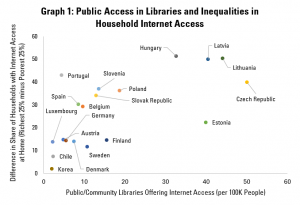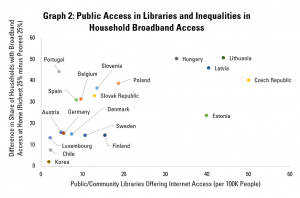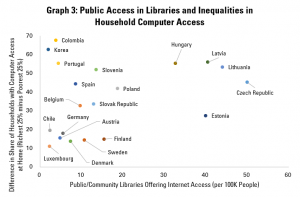Libraries will be back again at the 2023 Internet Governance Forum, held this year in Kyoto, Japan, on 8-12 October. Under the heading ‘The Internet We Want’, the focus is in line with the new emphasis of what can and should be done, and by who, in steering the development of the internet. This blog sets out a number of issues to watch out for.
Through our participation – both the events we are organising and those we attend in general – the library delegation will both be promoting the role of libraries as key players in ongoing internet development, and a wider vision of the internet we want.
This blog sets out the context of the event, and how libraries fit in with some of the key themes and agendas on the table.
The need for governance
This Internet Governance Forum takes place at a time of growing interest at the global level in the way that the internet works. Almost 20 years on from the original Internet Governance Forum, there is a sense among governments – and societies as a whole – that not enough has been done to regulate digital technologies, and so that ‘something must be done’.
The evidence of a variety of failures – in parallel, there are concerns about the power held by major companies to steer and influence individuals’ behaviour (raising questions about human rights and agency), the negative consequences of the speed at which information can travel online, and the lack of protections for human rights (including privacy). However, there are also many people still without connectivity, or at least without the skills and access to content needed to realise its potential.
In finding solutions, it is clear that actions by national governments alone are not enough. Not only are many of the key internet actors global, but the whole point of the internet is that information and materials can flow across borders. Even the best drafted national law cannot be truly effective outside of their own jurisdiction.
Yet there are also many countries which simply don’t have the resources to invest in delivering connectivity for everyone, backed up by sufficient infrastructure to deliver skills and content. Those who have the resources may, for political reasons, may not use them effectively.
As a result, not only do we have continued inequalities in connectivity and rights online, but when there has been action by governments, differences between national laws risk splitting the internet into pieces.
Therefore, there is a growing drive at the international level to intensify work around internet governance. The UN Secretary General has promoted the idea of Digital Cooperation, and subsequently set up a Leadership Panel for the IGF, aiming to create a stronger sense of direction.
Now, there is also the Global Digital Compact, which aims to provide a structure for various discussions within the UN, and UNESCO’s Guidelines for Platform Regulation, all of which aim to prevent fragmentation. Within this space, the pressure is on the IGF to demonstrate its value as a space for discussing the key issues.
For libraries, the idea that information needs governance is nothing new. Indeed, the existence of libraries is an example of an active intervention to ensure that information works for people. It is therefore normal that we support the idea of the internet being governed. The question then is how, by whom, and for what purpose.
Governance, not government
The fact of talking about ‘governance’ not ‘government’ is important, as it underlines that the way the internet runs should involve all stakeholders.
Partly, this is just a result of how the internet developed, with business, governments and technologists shaping the internet as it developed and spread. While it is hard to deal in counterfactuals, this model may well have been what allowed the internet to expand so rapidly in the first place.
However, this is worth defending. We know that if governance of the internet was left to governments alone, politics would soon take over. We are already seeing how different approaches to different aspects of internet regulation are leading to fragmentation, with barriers to information flows emerging at borders.
More than this, however, a multistakeholder approach opens possibilities to ensure that the voices of those who use the internet are represented. This is important, given that ultimately, the internet is not an end in itself, but a tool for achieving wider objectives. As such, the success of the internet can only really be measured in terms of how far it improves outcomes when it comes to education, research, health, democracy and beyond.
Libraries are particularly well placed to participate. We are pre-digital institutions that have proactively looked to seize the opportunities provided by the internet to enhance our positive impacts on society. We therefore have valuable experience to share about how the internet should work in order to deliver on broader societal and sustainable development goals.
We therefore have an interest in defending the multistakeholder model, given the guarantees it offers to bring our voices – and those of our users – to the table.
As a slight tangent, there is a question about whether it even makes sense to focus on the internet as the subject of governance discussions. As highlighted above, the success of the internet will be measured in the success of schools, hospitals, research centres and economies. There is a case for saying that we need these to be the focus. At the same time, such an approach also risks creating confusion, and taking away from the nature of the internet as a multipurpose infrastructure, not just for existing uses but also for exciting new ones.
So to answer the question in the previous section, what we want is a model of internet governance that is participatory, ensures that the experience of libraries and their users are heard, and that focuses on the real-world results it creates.
Key topics of discussion at the IGF
Breaking down this much broader question, there will be a number of themes on the agenda in Kyoto. In this final section, we take an overview of these, and how libraries fit in.
A good starting point is the set of five key characteristics set out in the document prepared by the IGF Leadership Panel, defining what they see as core to ‘The Internet We Want’.
First of all, they call for an internet that is whole and open. This underlines concern that diverging national approaches to regulating the internet risk leading to creating barriers between jurisdictions. For libraries, the possibility to give users access to information from around the world is crucial, and so we have a strong interest in opposing fragmentation. In particular, as set out in our blog on the topic, action to ensure that copyright exceptions align between countries, favouring cross-border collaborations, should be part of any agenda on this point.
Secondly, there is a focus on the internet being universal and inclusive. Much of this looks at the question of supporting meaningful access/connectivity. Libraries clearly have a role here, thanks to the devices we offer (people often only have phones), our spaces (safe, non-commercial), our staff (dedicated to the public interest and ready to help, especially with adequate training), our services (including those put on with partners), and our content (both digitised and created, especially from marginalised groups). An internet without libraries is far more likely to be unequal, and to leave more people seeing the world through a social media app.
Third, the Panel calls for internet to be free-flowing and trustworthy. This underlines the importance of ensuring that there are sufficient guarantees, for example of privacy, in all parts of the world, giving the confidence necessary to enable sharing. Again, this ties into the logic, in libraries, of applying ethical principles in the way that we work with our own users, especially around privacy. Our work to defend the rights of our users not to be tracked – in particular without their consent – fits in well with this work here.
Fourth, the Panel demands an internet that is safe and secure. Key to this is more work around cybersecurity, including both clearer principles about government use of cyberattacks to harm other countries, and building resilience to attacks from other actors. Once again, there is a role for libraries to play, both in advocating for policies that respect the work of libraries, and in providing support to individual internet users to keep themselves safe online.
Finally, the Panel argues that the internet they want should be rights-respecting. In addition to a general focus on protecting rights, there is a welcome and positive reference to the importance of the rights to research for example. For libraires, this comes back to the question of what the internet is for in the first place – we would argue that the success of the internet as a whole indeed can only be measured in terms of how much it is allowing more people to fulfil their rights to education, research and culture, amongst other things.
Beyond these issues, another popular theme at the moment is the idea of Digital Public Infrastructures. This refers to services and tools that provide open and interoperable means of achieving a variety of other goals. Traditionally, tools such as digital identification schemes (making it possible for a variety of services to confirm people are who they say they are), or payment systems are given as examples.
Of course, libraries themselves are arguably either part of the digital public infrastructure, or at least an essential complement to it. Through the internet access that they offer, they help ensure that everyone has an on-ramp to digital services enabled by other infrastructures. Beyond this, of course, they also are sources for plenty of online content, and often manage key digital public goods, such as open science repositories.
Conclusion
Through our engagement at the IGF, we will be working to ensure that other stakeholders recognise the essential role of libraries in making the internet work, and so the need to include us in planning and delivery at all levels. We hope that this will lead to new partnerships and possibilities for libraries around the world.
In turn, we need ourselves to keep our focus on how we fit into these broader agendas, learning to internalise wider policy issues and make them our own. In particular with the upcoming revision of IFLA’s Internet Manifesto, we look forward to engaging our field to achieve this.


